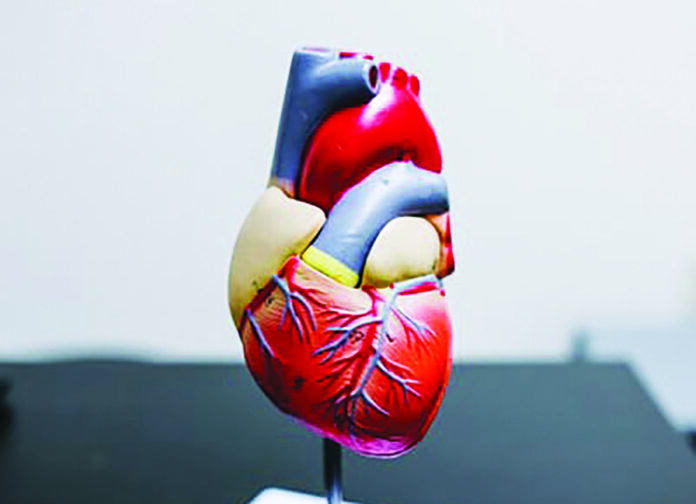
By Hakima Raziyah A. Mumin
Our health depends on a great many things. Getting fresh air, sunshine, and exercise are major factors in health. Getting enough rest, drinking sufficient water, and living as stress-free as possible also aid the body in staying in homeostasis. Your diet, of course, is very important. It starts with good, clean food; food that is grown in organic soil enriched with microorganisms that pass the nutrients on to the plants, and those nutrients are then passed on to you.
Our food should contain vitamins and nutrients. Eating should not only be for pleasure. It should be for sustaining our lives. We have been reduced to taking supplements because our food does not sustain us. Our soil needs to be balanced so that the vegetables that grow in it will nourish us. Growing your own food is the only way to ensure that your soil is rich and nutritious. Malnutrition is rampant around the world, and the chemicals in store-bought foods are destroying our health.
Cardiovascular disease remains one of the leading killers of humanity. A diet that is geared towards aiding the heart to stay strong and in the best condition should be investigated. Herbs are very helpful, as they are a concentrated whole food source. Herbs can address heart and circulatory problems. Increasing vegetable intake and decreasing meat intake is also helpful to the heart by giving the liver a little vacation. Meat is harder to break down and digest. Vegetables are free of uric acid (which meat contains); these abundant acids cause gout, arthritis, bursitis, and rheumatisms. When too much meat is eaten, it causes the blood to become thick.
Several of the foods consumed, such as junk food, contain empty calories, which are calories that give you no nutrition. An ideal diet is full of enzymes, vitamins, and minerals. A healthy body manufactures its own enzymes. A lack of enzymes in the body is attributed to aging; so elders must be extra careful to eat nutrient-rich foods.
When going to food stores, there are so many choices to choose from. Every food group has hundreds of categories. Shop for natural food that will help you and not harm you.
Here are a few recipes to get you started which are quick and easy, heart-healthy, vitamin and mineral-packed, and good for breakfast, lunch, or dinner!
Chickpeas are a very good source of protein. They contain phosphorus, vitamin B6, selenium, thiamine, magnesium, iron, and copper and are high in fiber. Chickpeas contain plant protein. They also help regulate blood sugar levels by slowing down sugar absorption. Chickpeas lower cholesterol and promote healthy bacteria in the intestines.
Here are two recipes that contain chickpeas.
Smoky Kale with Chickpeas
Ingredients:
- Two large bunches of kale
- Two onions
- One can of chickpeas
- Three fresh garlic cloves or garlic powder
- ½ tsp smoked paprika and or Chipotle powder
- ½ tsp cayenne
- Avocado oil or extra virgin olive oil
- Two tbsp of Coconut Liquid Aminos (coconut liquid aminos is made from coconut tree sap and sea salt and is naturally aged, it contains no gluten or soy, and contains amino acids which are the building blocks of proteins)
Drizzle
- Two tsp peanut butter
- Two tbsp of sesame seed oil
- Two ts coconut sugar
- One tbsp garlic powder/ minced garlic
- Three tbsp apple cider vinegar
- Two tbsp lemon juice
- Two tbsp crushed red peppers
Cooking Instructions:
1. In a deep pot, pour enough avocado oil to cover the bottom. Add the chopped onions and fry them until they are translucent. Add the cleaned kale and sauté until the kale starts to wilt. Cover and cook for 15 minutes on a medium to low flame, add water if needed, and add one can of washed chickpeas, garlic, smoked paprika, and liquid aminos. Cover and cook for 10-15 more minutes. Keep checking to make sure it doesn’t dry out. When the kale has reached the consistency of tenderness that you prefer, turn off the pot.
2. For the drizzle, in a clean bowl add two tbsp of organic peanut butter, 2 tbsp of sesame seed oil, apple cider vinegar, lemon juice, 2 tbsp coconut sugar, crushed red peppers, and garlic powder. Mix everything together thoroughly, adjust the ingredients to your preference, and drizzle this over the kale.
Zucchini Chickpea Skillet
- 1 onion
- 2 medium size zucchinis
- 2 cans chickpeas
- 3 garlic cloves
- ½ tsp red chili flakes
- fresh coriander
- lemon juice
- olive oil and a tad of butter
- Coconut Liquid Aminos
Cooking Instructions:
1. Dice the onion into small squares, and add oil and butter to the frying pan. Fry the onions until they are translucent. Add the zucchini and stir fry for 5 minutes, then add the chickpeas. Stir fry until the zucchini is slightly wilted, and add the chili flakes and lemon juice. Mix thoroughly and remove from the heat. Allow the veggies to rest for a few minutes, then add the remaining ingredients: black olives, and the coconut liquid aminos.
Other foods that are heart friendly are wild-caught salmon, avocado, kelp, green tea, wild-caught trout, dulce, pomegranate, turmeric, cumin, apples, lemons, and berries. All foods should be organic. Eating good fats like real butter, avocado oil, and first press extra virgin olive oil helps your heart stay healthy. Eating sprouted grains such as fenugreek, mung beans, or alfalfa sprouts are all very good sources of gut-healthy enzymes. Let your food be your medicine, and be careful of foods that can harm you.
Resources:
- Let Food be your Medicine, by Don Colbert, MD
- www.hsph.harvard.edu
- www.stylecraze.com
- www.healthgrades.com





